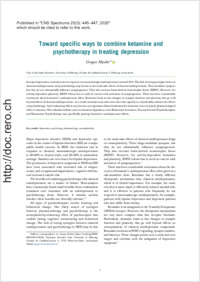Toward specific ways to combine ketamine and psychotherapy in treating depression
- Hasler, Gregor Translational Research Center, University Hospital of Psychiatry and Psychotherapy, University of Bern, Bern, Switzerland - Division of Psychiatry and Psychotherapy, Department of Medicine, Faculty of Science, University of Fribourg, Fribourg, Switzerland
-
19.06.2020
Published in:
- CNS Spectrums. - 2020, vol. 25, no. 3, p. 445–447
English
In major depression, remission rate in response to monoaminergic antidepressant is around 50%. The lack of strong synergies between classical antidepressants and psychotherapy may be due to the molecular effects of classical antidepressants. They modulate synapses but they do not substantially influence synaptogenesis. They also increase brain-derived neurotrophic factor (BDNF). However, for activity-dependent plasticity, BDNF release has to work in concert with activation of synaptogenesis. There has been considerable excitement about ketamine’s antidepressant effect. Ketamine leads to fast changes in synaptic function and plasticity that go well beyond effects of classical antidepressants. As a result, ketamine may turn out to have the capacity to considerably enhance the effects of psychotherapy. Such enhancing effects may become an important clinical indication for ketamine since its purely pharmacological effect is transient. This editorial outlines some mechanistic hypotheses, how Behavioral Activation, Trauma-Focused Psychotherapies and Humanistic Psychotherapy may specifically prolong ketamine’s antidepressant effects.
- Faculty
- Faculté des sciences et de médecine
- Department
- Master en médecine
- Language
-
- English
- Classification
- Biological sciences
- License
- License undefined
- Identifiers
-
- RERO DOC 328646
- DOI 10.1017/S1092852919001007
- Persistent URL
- https://folia.unifr.ch/unifr/documents/308768
Statistics
Document views: 90
File downloads:
- has_tsw.pdf: 974
